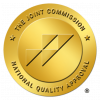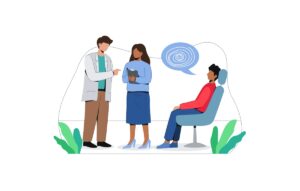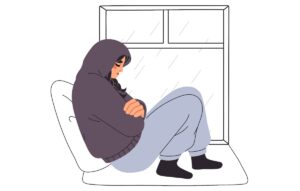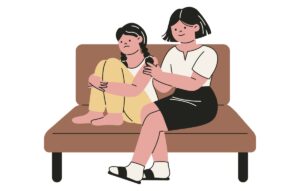Quick Takeaway
- Frequent moves deeply shape a young person’s identity, belonging, and emotional stability, especially during adolescence when identity formation is at its peak.
- Teens who grow up between cultures (TCKs) may experience anxiety, depression, or confusion as they navigate attachment disruptions, grief, and the “in-between” experience.
- PRI Treatment Center in La Jolla provides specialized PHP and IOP care that supports teens and young adults through transition stress, identity struggles, and emotional overwhelm.
When Growing Up Means Constant Change
For many young people, “home” is not a single place. It’s a collection of countries, states, cultures, and communities they’ve moved through. Often called Third Culture Kids (TCKs)—grow up between worlds, carrying pieces of every place they’ve lived while struggling to fully belong in any one of them.
While this upbringing builds resilience, adaptability, and global awareness, it can also create emotional friction:
- Identity confusion
- Anxiety or depression
- Difficulty forming or maintaining friendships
- Grief after each move
- Feeling “in-between” spaces
- Challenges with trust, belonging, and stability Our programs—PHP and IOP for adolescents, teens, and young adults—are designed specifically for youth who face complex developmental, emotional, and cultural transitions.
At PRI Treatment Center in La Jolla, CA, our clinical team understands these complexities deeply. Our founder, Dr. Charles Warter, is himself a TCK and developmental psychologist. Our programs—PHP and IOP for adolescents, teens, and young adults—are designed specifically for youth who face complex developmental, emotional, and cultural transitions.
Many parents feel unsure how to support their child during these changes. You’re not alone, and neither is your teen.
🎥 Watch YouTube Video: The Destinations Podcast: Dr. Charles Warter on Healing, Identity & Connection
What Is a Third Culture Kid (TCK)?
A Third Culture Kid is a child or teen who spends a significant portion of their developmental years moving between cultures or locations. This includes:
- Military families
- Diplomatic families
- Missionary families
- Expat families
- International educators
- Corporate relocations
- Domestic relocations (moving frequently within the U.S.)
- Global nomads
The “third culture” emerges from the mixture of:
- The culture of origin
- The culture(s) they live in
- The new blended identity they form between worlds
This identity offers many strengths—but without emotional support, it can also lead to confusion, disconnection, or anxiety.
How Frequent Moves Impact Emotional Development
Each move does more than change a postal code. For children and adolescents, relocation disrupts fundamental developmental processes.
Frequent moves can create:
- Loss of stability: Home, friendships, and routines reset each time.
- Loss of control: Moves often occur without the child’s input, creating helplessness.
- Unresolved grief: Goodbyes pile up without closure.
- Adaptation fatigue: Constantly analyzing norms, language, and social expectations strains emotional bandwidth.
- Interrupted development: Identity formation, belonging, and friendships restart repeatedly.
Some teens internalize these transitions as exploration. Others internalize them as instability or emotional loss. Both experiences are valid.
Identity Formation & the “In-Between” Experience
Adolescence is a critical period for identity development. For TCKs, this process becomes more layered and complex.
Common identity themes TCK teens express:
- “I don’t know where I’m from.”
- “I belong everywhere and nowhere.”
- “I become different versions of myself depending on where I am.”
- “People don’t understand my story.”
- “My experiences feel invisible.”
Psychologists call this the third space—a psychological home created between cultures. It is rich, adaptive, and expressive but can also lead to:
- Confusion about belonging
- Difficulty describing one’s identity
- Feeling misunderstood
- Emotional isolation
This becomes even more challenging when moves occur suddenly, during significant developmental milestones, or in families experiencing stress.
Attachment, Adaptation & Why Some Teens Struggle More Than Others
TCK research and clinical experience show that family system stability is the strongest protective factor during relocations.
Teens adapt better when:
- Home is emotionally stable
- Parents communicate openly
- Cultural differences are acknowledged
- Routines and rituals stay consistent
- Teens have some sense of agency
- Moves are explained and anticipated
Teens struggle more when:
- Moves are abrupt or sudden
- Family tension or conflict exists
- Emotional needs are minimized
- There is no time to process grief
- Teens feel pressure to “bounce back” instantly
- Trauma, loss, or stressful life events occur
Transition sentence added for flow:
Once these patterns begin affecting daily functioning, relationships, or school performance, structured clinical support may be needed to help the teen stabilize and heal.
Joint Commission Accreditation, DHCS License,
& Clinical Partnership with CPCMG
Joint Commission Accreditation, DHCS License, & Clinical Partnership with CPCMG




In Clinical Partnership With
PRI Treatment Center is proud to clinically partner with Children’s Primary Care Medical Group San Diego to expand access to high-quality mental health services. Together, we’re bridging the gap between primary care and mental health to better support the well-being of children and families in our shared community.
Clinical Signs a Teen May Need Additional Support
Transition-related stress can evolve into clinical symptoms requiring higher levels of care such as Partial Hospitalization (PHP) or Intensive Outpatient (IOP) treatment in La Jolla, CA.
Watch for:
- Persistent sadness or depression
- Anxiety or panic
- Emotional outbursts
- Irritability or anger
- Withdrawal or isolation
- Difficulty forming friendships
- Academic decline
- School refusal
- Identity confusion impacting daily life
- Loss of motivation
- Sleep disruptions
- Perfectionism or fear of failure
- Self-harm behaviors
- Substance experimentation
If you’re recognizing these signs, early intervention can prevent symptoms from worsening and help your child regain stability.
Your Teen Deserves Support That Understands Their Story
If your teen is struggling after a move—or facing symptoms of anxiety, depression, or emotional overwhelm—PRI Treatment Center in La Jolla offers PHP and IOP programs designed for youth navigating identity, transitions, and high emotional stress.
How PRI Treatment Center Helps TCKs & High-Mobility Youth
PRI was built to support complex developmental and emotional challenges. Our programs serve adolescents (10–13, 14–18) and transitional young adults (18–25).
Our Approach Includes:
✔ Attachment-Based Therapy
Rebuilding emotional safety, trust, and connection.
✔ Trauma-Informed, Culturally Responsive Care
We understand the unique emotional layers of cultural transitions, belonging, and identity.
✔ Immersive Multifamily Group Therapy
One of our strongest differentiators:
- Up to 10 families participate together
- Parents learn skills
- Teens practice emotional expression
- Families rebuild connection
✔ Evidence-Based Modalities
- DBT
- CBT
- ACT
- Mindfulness training
- Emotional regulation skills
- Identity exploration support
✔ Specialized Support for Military Families
Through our TriCare + TriWest contract, we provide accessible care for families experiencing frequent PCS moves.
✔ Experienced Clinicians with TCK Expertise
Our team—including Dr. Warter—understands the psychological impact of growing up between cultures.
✔ Stabilization Through PHP & IOP
We provide structured treatment for youth struggling with:
- Anxiety
- Depression
- Transition stress
- Trauma
- Emotional dysregulation
- Identity concerns
- Behavioral issues
Helping Parents Navigate Cultural Transitions
We support families before, during, and after major transitions.
Before a Move
- Prepare teens emotionally
- Set expectations
- Maintain familiar rituals
- Discuss fears openly
- During a Move
- Provide emotional attunement
- Help teens maintain agency
- Support friendships and closure
After a Move
- Establish new routines
- Help your teen rebuild belonging
- Watch for early signs of emotional stress
- Maintain openness and communication
Relocations don’t have to destabilize your child. With support, these experiences can become sources of resilience and self-awareness.
Your Teen Is Not Alone — And Neither Are You
PRI Treatment Center in La Jolla, CA offers compassionate, evidence-based treatment for teens and young adults experiencing:
- Anxiety
- Depression
- Identity struggles
- Cultural transition stress
- Emotional dysregulation
- Trauma
- Social or school challenges
- Family system strain
Call Now for Support
Your teen’s experiences matter. We’re here to help them thrive—no matter where their journey has taken them.
Frequently Asked Questions
Why do frequent moves impact my teen’s mental health?
Frequent transitions can disrupt friendships, routines, identity formation, and emotional security, creating stress, anxiety, or depression.
When should I seek professional help for my TCK teen?
If you notice persistent sadness, anxiety, withdrawal, identity confusion, or academic decline lasting more than a few weeks, structured treatment may help.
Does PRI support military and expat families?
Yes. Our team specializes in TCK, military, and high-mobility youth. We also accept TriCare/TriWest.
What levels of care does PRI offer?
PRI provides PHP and IOP programs in La Jolla for adolescents and young adults needing structured, intensive mental health treatment.

Dr. Warter received his doctorate in Clinical Psychology from The Wright Institute in Berkely, California, completed his Predoctoral Internship at USC’s Children’s Hospital Los Angeles, and was a Postdoctoral Researcher at USC’s Institute for Integrative Health and Wellness. Dr. Warter has also been trained at UCSF School of Medicine, Kaiser Permanente, and in community clinics in rural, underserved communities in Argentina and Paraguay. Dr. Warter has received training in providing parents with guidelines to help prevent behavior problems and enhance communication skills and strategies to promote children’s social, emotional, and academic competence. Dr. Warter has also published and presented at the University of Naples and the University of Buenos Aires on subjects related to Third Culture Kids and the impacts of Social Media on Personality and Self Esteem.






